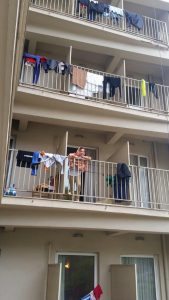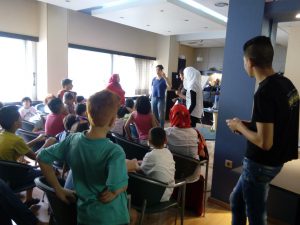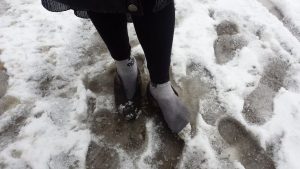Infomobile
Continue reading ‘Paralysed and stored at the margins: Refugees in Greece forced to survive snow and cold’
6 months – more than 1,000 refugees hosted
A booklet with memories, thoughts and feelings of the ones who were there from the very first day and who stayed until today.
Uprisings in Moria on 24th October, EASO-containers burned down once again
Already for weeks, tensions on the Aegean islands run high after the Greek government announced to open three more so-called “hot-spots” only for “pre-removals” on the islands of Lesvos, Chios and Kos. They are, in fact, deportation prisons. Local residents and municipalities oppose these plans. At the same time, the atmosphere within the camps is boiling over. After months of waiting, the entire time threatened to be deported to Turkey, people have repeatedly protested against the imprisonment in inhumane conditions. It has been announced that, from November onward, weekly deportations to Turkey for 200 persons each time will take place, coordinated by Frontex. This would turn Lesvos into a deportation hub.

Continue reading 'Lesvos turns into a deportation hub to Turkey'
Since 2013, Welcome to Europe (w2eu) and Youth Without Borders (JOG) organise journeys for young refugees, to make it possible for them to return to the place where they had first reached Europe: The Island of Lesvos/Greece. This year, the ‘back to the border’ journey turned into a horror trip, especially, for all of us who were without European identity cards. Twice, the police and coast guard didn’t let us take the ferry to Piraeus (Athens) and leave the island as they said they had to re-check the asylum seekers cards for their genuinity – a paper issued by the Greek government itself. We observed dozens of people who were pulled out of the passengers queues at the airport while providing for passports or Greek aliens documents and dozens more who were unsuccessfully trying to leave from the island from the port along with us even though some of them were living and working in Greece for years. Continue reading 'Frontex’s Prison Island Lesvos: Apartheid in the tourist paradise'
 On Tuesday we finally got the guide! We were really happy and started to hand out them at the same day. We went to Moria and Kara Tepe and gave it to the people we met. This year it is much more difficult, we are not allowed to enter the camps and we can only reach some refugees. If we can speak with them they are happy to get informations – like we know it from the last years. In the last time there have been organisations which tried to hand out bibles and religious things. Because of that there is a big mistrust against everybody who is handing out paper. In Kara Tepe we have not been allowed to hand out the guides between the cantinas which are in front of the camp and where the people are sitting. We had to stand close to the dangerous road – outside the ground which belongs to the camp. In Moria they check identities of two of us – the cantinas are on the other side of the road, so that we could stay there and continue.
On Tuesday we finally got the guide! We were really happy and started to hand out them at the same day. We went to Moria and Kara Tepe and gave it to the people we met. This year it is much more difficult, we are not allowed to enter the camps and we can only reach some refugees. If we can speak with them they are happy to get informations – like we know it from the last years. In the last time there have been organisations which tried to hand out bibles and religious things. Because of that there is a big mistrust against everybody who is handing out paper. In Kara Tepe we have not been allowed to hand out the guides between the cantinas which are in front of the camp and where the people are sitting. We had to stand close to the dangerous road – outside the ground which belongs to the camp. In Moria they check identities of two of us – the cantinas are on the other side of the road, so that we could stay there and continue.
When we started to hand out the guides we realised that this year the French version is missing because there are many more people from (western) Africa here in Lesvos. Many of them are French speakers. We will try to speed up the French translation to at least have an online version.
What is really clear this year: everything is controlled very much. Many big NGOs are working in the camps, networks like us are not welcome and they don‘t let us in. This was really frustrating, although we met people, spoke with them and spread the guides.
You can find the online-versions here:
Arabic: http://w2eu.info/greece.ar.html
Farsi: http://w2eu.info/greece.fa.html
English: http://w2eu.info/greece.en.html
PDFs in all languages:http://w2eu.info/greece.en/articles/greece-guide.en.html
 Photos by Marios Lolos
Photos by Marios Lolos
Eida was born 1890, she is Syrian and all her children and grandchildren are in Germany. When they left she didn’t want to go and was taken care by a family in Kobane. When the family decided to go also Eida had no one anymore and decided to follow. After many adventures they arrived in Lesvos and stayed for 1 month in Moria Hotspot without any NGO organizing housing or care for the 126 year old lady. After they finally got their papers they travelled all together to Athens and went to a hotel. The wife and mother of the 4 small kids is giving birth these days and the Noborders Athens group supports the family and asks for financial support to manage to house this unbelievable travel group. Again it is activists that manage to show respect to fleeing people. One of the oldest women in this world fleeing, we all have to support her now! Continue reading ‘126-year old woman arrived on Lesvos – fleeing to join her children and grandchildren in Germany’
A talk with a friend from Ethiopia on Lesbos Island…
If you want to run away and you are black they see you from far, White people they can run. Me sometimes i ask where can I get this white skin? For white people it is easy to run away.
……………..
“I am 21 years old. I come from West Ethiopia. I belong to the Oromo. The Oromo are a very big tribe, which inhibits a very rich part of country in the country. This is why we have so many problems.
Before I left I was a student in Adis Abeba and I also used to run. I have a good time: 10 kilometers I used to finish in 33’.
In my university they killed many Oromo students. They used to pick… well, they know us by our traditional names. My name is an Oromo name. They used to pick up all clever students from Oromo tribe and said they wanted to give us money and teach us to teach Oromo people to change their mind. They wanted us to make our people accept to give our land away. They wanted to force us to go and change them. We said: No! We can not do that. We can not change the rules.
Continue reading ‘“My shoes burned in Moria. Before my shoes burned I used to run.”’
A refugee-housing squat as an example of how to fight social struggles together on a daily level and for another tomorrow
 „The City Plaza squat at 78 Acharnon celebrates its first month. The hotel now houses refugee families totalling 385 people, including 180 children. These include 22 single parent families, as well as people with disabilities. The nationalities that make up City Plaza include Afghans, Kurds, Syrians, Palestinians, Iranians, Iraqis and Pakistanis. The families being housed at City Plaza were selected on the basis of their previous “housing” arrangement as well as on the particular problems being faced by each one. Each family lives in a separate room of the hotel, while all inhabitants are provided with breakfast, lunch and dinner, as well as with hygiene products and other essentials. Nearly all are covered through solidarity offerings, while the few purchases that need to be made are financed through donations sourced from within Greece and from abroad.
„The City Plaza squat at 78 Acharnon celebrates its first month. The hotel now houses refugee families totalling 385 people, including 180 children. These include 22 single parent families, as well as people with disabilities. The nationalities that make up City Plaza include Afghans, Kurds, Syrians, Palestinians, Iranians, Iraqis and Pakistanis. The families being housed at City Plaza were selected on the basis of their previous “housing” arrangement as well as on the particular problems being faced by each one. Each family lives in a separate room of the hotel, while all inhabitants are provided with breakfast, lunch and dinner, as well as with hygiene products and other essentials. Nearly all are covered through solidarity offerings, while the few purchases that need to be made are financed through donations sourced from within Greece and from abroad.
In a framework of self-organization and coexistence, there are teams for cleaning, cooking, security, education and childcare, medical care, communications, reception, as well as regular assemblies of refugees and solidarians. Initiatives such as that of City Plaza, apart from granting obvious rights and needs, also put in practice a conception of everyday life which aims to, through self organization and “bottom up” emancipation, ultimately form a space of freedom and creativity, which will act as living proof of the society which we envision.“ This is how the call for an Open Assembly in the City Plaza Hotel in Athens starts. The whole text can be found on their Blog.
 Among the first residents of the squat are many highly vulnerable people and refugees who have been supporting them in solidarity already before, when they were still neighbours in one of the overcrowded and sub-standard mass camps of the government. More than that, those that already helped others to self-organise, who accompanied them to hospitals and to NGOs, who voluntarily translated, they also suggested persons to move in who were in great need. So there is a lot of experience in self-organising under extremely difficult conditions already existent among the inhabitants which meets in one space with the solidarity of others from Greece and all over the world. During our first visit to the ‘Plaza’ we spoke with many of
Among the first residents of the squat are many highly vulnerable people and refugees who have been supporting them in solidarity already before, when they were still neighbours in one of the overcrowded and sub-standard mass camps of the government. More than that, those that already helped others to self-organise, who accompanied them to hospitals and to NGOs, who voluntarily translated, they also suggested persons to move in who were in great need. So there is a lot of experience in self-organising under extremely difficult conditions already existent among the inhabitants which meets in one space with the solidarity of others from Greece and all over the world. During our first visit to the ‘Plaza’ we spoke with many of the refugees who found a temporary home there. It is them who described to us their impressions and experiences of the first three weeks and what is most important for them about this space.
the refugees who found a temporary home there. It is them who described to us their impressions and experiences of the first three weeks and what is most important for them about this space.
 Since the early morning hours of today, Greek riot police started to evict Idomeni. Idomeni became a symbol since the closure of the Greek-Macedonian border. It became a symbol of Europe at a crossroad. It became a symbol of a militarized and repressive borderregime violently gaining back force. And even more then this it became a symbol of hope and of the strong commitment of thousands of families, women, men and children in their daily struggle for freedom of movement and open borders.
Since the early morning hours of today, Greek riot police started to evict Idomeni. Idomeni became a symbol since the closure of the Greek-Macedonian border. It became a symbol of Europe at a crossroad. It became a symbol of a militarized and repressive borderregime violently gaining back force. And even more then this it became a symbol of hope and of the strong commitment of thousands of families, women, men and children in their daily struggle for freedom of movement and open borders.
 Maybe Idomeni will be emptied. Maybe all will be forced into isolated camps all over Greece. But not only is the soil of Idomeni now full of the stories of resistance.
Maybe Idomeni will be emptied. Maybe all will be forced into isolated camps all over Greece. But not only is the soil of Idomeni now full of the stories of resistance.
It is the travellers who will keep this struggle alive and tell the stories to those who will follow. A friend in a very similar situation, stuck in Greece many years before said:
Noone can stop the rain.
For updates on the eviction, follow the Live-Ticker of Moving Europe:
http://moving-europe.org/24-5-2016-updates-from-the-eviction-in-idomeni/
On the March 19, 2016, one day before the implementation of the EU-Turkey deal, Hamid* and his three friends arrived in a boat with 46 people on the shores of Chios. They where transferred to detention in VIAL. From that day on they suffer mostly from the lack of freedom and protection. They have expressed fear and anxiety due to a lack of information on their rights and growing tensions among inmates. According to the teenager many refugees in VIAL suffer severe psychological problems due to the detention conditions, the violence (also by law-enforcement officers) and the fear to be the next returned to Turkey.
„If every one gets to know about our problems in VIAL it will be good. I don’t have any one in this world. I swear. There is no one but God I can rely on.
Continue reading ‘Voices from Inside VIAL / Chios: Unaccompanied minor detained since 49 days’



